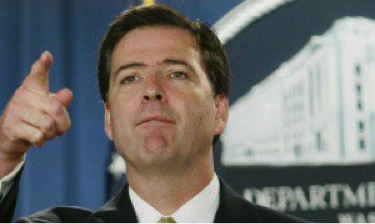Chopping FBI Director James Comey: “Attorney General Sessions Plan to Undermine and Outflank Comey”

“Having refused to admit his errors, the [FBI] Director cannot be expected to implement the necessary corrective actions.” – US Deputy Attorney General Rod Rosenstein
Any sense that Donald Trump had found some accord with James Comey of the FBI gathered from his investigative zeal regarding Hillary Clinton’s improper use of a private email server should always have been doubted.
Trump is not a president who likes matters accountable and clear, except in a jaw jaw sort of a way, the brute who wants to avoid surprises while always keeping one in reserve. The language of the hectoring bully is never far, the turn that means genuine conversation is always going to be hard to have.
The language of dismissal regarding the FBI Director was that of an assassination. Comey, came the announcement via Sean Spicer, “has been terminated and removed from office”. The letter to Comey, penned by Trump, cited agreement with US Attorney General Jeff Sessions that “you are not able to effectively lead the Bureau.”

US Attorney General Jeff Sessions
Erratically, Trump had thrown in his weight behind Comey when things suited him. The political winds were favourable in November, when he had Hillary Clinton on the ropes. “What he did,” claimed Trump on the issue of reopening the investigation into the Clinton emails, “brought back his reputation”.
The edifice of support was, however, a rotten one, and the Attorney General’s department was already hatching a plan to undermine and outflank Comey. The Deputy Attorney General, Rod Rosenstein, attempted to find some common ground across the spectrum regarding the FBI director’s yawning faults.
“Almost everyone agrees the Director made serious mistakes; it is one of the few issues that unites people of diverse perspectives.”
As for Rosenstein himself, he found it difficult to “defend the Director’s handling of the conclusion of the investigation of Secretary Clinton’s emails” and did “not understand his refusal to accept the nearly universal judgment that he was mistaken.”
From the other side of the stalls, Comey had been harangued over supposedly selective judgements. The Democrats, still smarting from their election loss, found it inexplicable that Comey would first close the case against Clinton without prosecution in July last year only to then declare, 11 days prior to the election, that the inquiry had been reopened because of the discovery of more juicy emails.
The tune from Senator Minority Leader Chuck Schumer altered on Tuesday, modified by a less plaintiff voice and concern that the constitution was not so much being rocked as ravaged.
“We know that the House is investigating Russian interference in our election that benefited the Trump campaign. We know the Senate is investigating. We know the FBI has been looking into whether the Trump campaign colluded with the Russians – a very serious offence. Were those investigations getting too close to home for the president?”
There is little doubt that Comey has been rattled by the attention, which has, for the most part, been negative. In his May 3 testimony before the Senate Judiciary Committee, hyperbole intruded to make certain claims questionable. One related to the material from Clinton’s aide, Huma Abedin, which ran, according to Comey, in the order of “hundreds and thousands” of emails. Among them were more than just smidgens of classified information.
As luck would have it, Comey’s claims that such a mountain of information had manifested itself were rebuffed by his own organisation. There was nothing in the order of hundreds of thousands, merely two email chains containing classified information to husband Anthony Weiner.
The lack of faith shown in Comey by the Democrats packaged a few parcels of ammunition for Trump. The president naturally took to Twitter as the carnage unfolded.
“Cryin’ Chuck Schumer stated recently, ‘I do not have confidence in him (James Comey) any longer.’ Then acts so indignant.”[1]
Such a sacking does show, with some clarity, that the affairs of this Republic are bound to get more sordid before they get better. Trumpland is a truly fractious environment, one where battlegrounds and territory will be fought with primeval ferocity between the executive and its various arms.
“The administration of justice,” claimed Democratic Representative Eric Swallwell Jr., “must remain free of political influence, and President Trump just leaped over that line”.
This line has not so much been leaped over as redrawn. The moment Trump entered the White House he made it clear that conflict with traditional agencies, bureaucracy and institutions was inevitable. Draining the swamp, as he likes to term it, is akin to cracking a few skulls and breaking regulations in the name of reform.
This tarnishing episode has covered few in glory. The White House is hunkering down behind a wall of authoritarian protection, keen to immunise itself frorm disconcerting inquiries that might question its wisdom and probity. The Democrats, having also had their issues with the FBI, are now seeking a separate, independent office to target Trump. The politics of the Republic is moving into another ugly phase.
Dr. Binoy Kampmark was a Commonwealth Scholar at Selwyn College, Cambridge. He lectures at RMIT University, Melbourne. Email: [email protected]
Note
[1] https://twitter.com/realDonaldTrump/status/862135824745467905

